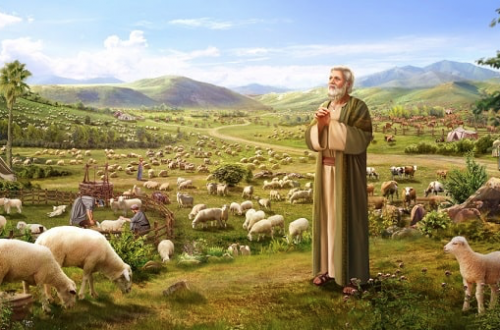Joseph’s dream
Genesis 37:1–4 and 12–28 are part of the lectionary readings for the tenth Sunday after Pentecost, which is August 9th. The narrative concerning Joseph begins when he was a young man of 17.
Joseph and some of his brothers were taking care of his father’s flocks (v. 2). The brothers had done something inappropriate while they were away from home tending the sheep. Joseph saw the wrongdoing and informed Jacob.
Commentators take different views of Joseph’s action. Some censure him as a tattletale, while others commend him for acting as a conscientious son. Although the text doesn’t state it, the brothers undoubtedly felt bitterness toward their younger sibling because he reported them.
Jacob compounded the friction between Joseph and his older brothers by showing his preference for the firstborn of his favorite wife, Rachel. Verse 3 explains that the patriarch loved Joseph more because he was born to his father in his old age.
In fact, Joseph was Jacob’s youngest son, next to Benjamin. Jacob demonstrated his favoritism by giving Joseph a special tunic.
It’s difficult to know the exact nature of this outer garment because of the unclear meaning of the Hebrew word that describes it. Differing opinions conjecture that the robe had long sleeves or was richly embroidered. In any case, it distinguished Joseph as the favored son of Jacob and the future ruler over the family.
When Jacob was younger, his mother liked him more than Esau, while Jacob’s father preferred Esau. This display of parental favoritism led to threats of murder and a deep rupture between the fraternal twins.
Having seen the damage such preferential treatment could create, Jacob should avoided repeating the same mistake with his children. Beyond question, as Joseph wore the ornate robe, it became a source of constant irritation to his older siblings.
Joseph’s brothers were reminded that their father loved Joseph best, a realization that fueled resentment and jealousy. The brothers’ hatred of Joseph prevented them from being able to speak kindly to him (v. 4).
The biblical text relates that Joseph experienced two dreams. In the ancient world, people believed that dreams were a window into knowing the future. This sentiment proved to be true in Joseph’s case, for God sent the dreams to show the superior blessings He would give to Rachel’s firstborn.
After experiencing the dream, Joseph related it to his brothers and in turn their hatred of him intensified (v. 5). Some commentators allege that Joseph was gloating over his siblings, that his demeanor was arrogant, or that his manner was condescending. However, there is nothing in the text to support these views.
In the first dream (v. 6), Joseph saw himself and his brothers bundling sheaves of grain in the middle of a field. This was a typical harvest scene.
Suddenly, Joseph’s bundle stood up. Then, his siblings’ bundles surrounded Joseph’s sheaf and bowed down to it (v. 7). The Hebrew verb used here denotes the kind of worship and obeisance servants would give to their master.
The brothers correctly interpreted the dream to mean that one day they would bow down to Joseph as their ruler (v. 8). This literally happened when Joseph became a ruler in Egypt.
As a result of the dream and Joseph’s retelling of it, his siblings hatred of him rose a notch higher. Given the existing family dynamics, the response of the brothers is understandable. They might also have been unsettled by what Joseph related, especially if they genuinely wondered whether God was using the dream to disclose what He would do in the future.
In Joseph’s second dream, he saw the sun and moon (the parents of the clan) as well as 11 stars (the siblings) bow down to him (v. 9). This time Joseph described the dream to his father as well as his brothers.
Now even Joseph’s indulgent father was upset with his favorite son. He expressed dismay at what he perceived was audacity and rebuked Joseph for it. Jacob accurately interpreted the dream to mean that he, his wife Leah (Joseph’s mother, Rachel, had died by this time), and his sons would all bow down to Joseph (v. 10).
This dream, too, referred to the future when Joseph would be a ruler in Egypt. While Jacob kept in mind and pondered what Joseph said, his brothers grew even more jealous of him (v. 11).
In relating the dreams, Joseph was only telling the truth. Yet, some commentators suggest that he was unwise to mention the dreams and that he was motivated by pride. There are few clues in the text, however, to support this view.
Later in the Genesis narrative, it is disclosed that Joseph had the ability to interpret dreams. Perhaps, then, he had an inkling of what his first and second dreams meant.
Also, while Joseph could have remained silent about the dreams, he chose to tell them. Of course, regardless of whether Joseph should have kept his mouth shut, his brothers were wrong to nurse feelings of jealousy and hatred against him.
Sometime after Joseph’s dreams, most of Jacob’s sons took his flocks about 50 miles north to Shechem (v. 12). A desire to get away from Joseph may have been one reason they traveled so far from their home in the Valley of Hebron.
Yet, if so, the attempt failed, for Jacob sent Joseph after his brothers to find out how they were doing (vv. 13–14). Neither the father nor his favored son could have known that more than two decades would pass before they laid eyes on each other again.
When Joseph reached Shechem, a man noticed him wandering around the countryside. When the man asked Joseph what he was looking for, he explained that he was searching for his brothers.
Joseph requested help from the stranger in finding where the group was grazing the flocks under their care. When the man mentioned overhearing them talk about going on about 15 miles north to Dothan, Joseph left for the place and found his brothers there (vv. 15–17).
For some time, feelings of ill will toward Joseph had been festering in hearts of his brothers. So, when the siblings spotted Joseph in the distance wearing his ornate robe, they hatched a scheme to murder him (v. 18).
The brothers literally referred to Joseph as “this master of dreams” (v. 19). The sarcastic tone of their statement reflected the deep and lingering resentment they felt toward Joseph and the dreams God had given him. The plan involved throwing the younger sibling into a nearby dry cistern.
Jacob’s sons agreed to lie about the demise of Joseph. When asked about him, they would claim that a vicious, wild animal had attacked and devoured him.
The brothers’ uncontrolled jealousy and hatred brought them to this evil intention. They imagined they could get away with their scheme because Joseph was away from their father’s protection, and there were no witnesses nearby to report their actions.
The siblings assumed that by eliminating their dreaded younger brother, they could prevent his dreams from coming true (v. 20). They did not realize, however, that God would use their actions to make the dreams a reality.
Based on verse 2, some think the sons of Bilhah and Zilpah (namely, Dan, Naphtali, Gad, and Asher; 30:4–13) were the instigators of the murderous plot. When Reuben (the firstborn son of Jacob through Leah) heard about the plan, he came to Joseph’s rescue by advising his brothers not to take the younger sibling’s life (37:21). Rather than harm Joseph and thereby shed innocent blood, Reuben urged the rest to bind Joseph and place him in the cistern, presumably to die of thirst and hunger (v. 22).
Reuben secretly planned to help Joseph escape and bring him back unharmed to Jacob. The tide of events, though, would wash away Reuben’s good intentions. More effective would have been for him, as the eldest son of the group, to put a complete end to the scheme.
Despite whatever admirable qualities Reuben had, he previously compromised his integrity and standing in the family by his incest with Bilhah, the concubine of his father (v. 22). Perhaps the memory of that incident spurred Reuben to make a halfhearted attempt to rehabilitate himself in the situation involving Joseph.
Eventually Joseph reached his brothers. Yet, rather than being greeted warmly, the older siblings stripped him of his ornate robe and consequently his status. This was the special tunic he wore out of respect for his father (v. 23). By harming Joseph, the brothers dishonored Jacob.
After removing Joseph’s outer garment, the siblings threw him into a nearby empty cistern. Though there was no water in it (v. 24), the underground tank would have been musty and moldy. For health reasons, it would not be a hospitable place to stay for long.
The brothers’ callous nature is evident as they sat down to eat some food (v. 25), seemingly indifferent to Joseph’s pleas for mercy (42:21). Then, sometime during the meal, they spotted a caravan of traders.
In ancient times, travel was extremely dangerous. The threat of robbers and wild animals discouraged most people from venturing out alone or even in small groups. For safety on the unmarked roads between Syria and Egypt, caravans such as the one mentioned in 37:25 were often formed.
The traders spotted by Jacob’s sons were carrying spices, balm, and myrrh down to Egypt. These were goods used in medicine, cosmetics, and preparing the dead for burial.
Judah, the fourth son of Jacob and Leah, questioned how he and his siblings would be profited by murdering their brother and hiding his body. All they would gain from such an act was a guilty conscience (v. 26). What the group failed to appreciate is that any harm they brought to Joseph would be a moral stain on their lives and an issue God would deal with as the Genesis narrative unfolded.
Judah’s face-saving scheme involved not directly laying a hand on Joseph. Instead, they would sell their despised younger brother to the Ishmaelites.
Archaeological records indicate that the Egyptians were always open to purchasing slaves, as well as other commodities, from traders such as the Ishmaelites. Judah’s plan would not only get rid of Joseph, but also at the same time make some money for his brothers.
The group liked Judah’s idea and so went along with it (v. 27). When the siblings pulled Joseph from the cistern, initially he may have thought that he would be freed.
Yet, perhaps to Joseph’s dismay, his brothers sold him as a slave to the Ishmaelites for 20 pieces of silver. The traders then took him to Egypt, where his life would be forever changed (v. 28).
Key ideas to contemplate
Favoritism is the practice of giving unfair preferential treatment to one person or group at the expense of another. This is exactly the case in Jacob’s family.
Jacob loved Joseph more than any of the father’s other sons and gave Joseph a special tunic to wear as a symbol of Jacob’s preference. While this may have helped Joseph to feel special, it infuriated his brothers, who became increasingly resentful of him.
1. The presence of favoritism. Regardless of whether we are doing it consciously, we might be showing favoritism toward one person at the expense of someone else. Parents, pastors, teachers, bosses, and grandparents are just some of the people who should examine how they are treating others to see whether they are playing favorites—and then change that mindset to reflect God’s attitude.
The Lord, who loves the entire world (John 3:16), plays no favorites. In heaven’s eyes, no person is overlooked or insignificant.
2. The lasting negative effects of favoritism. The destructive consequences of showing unfair, preferential treatment might be hidden for years. This is especially true if those not favored are afraid to voice their feelings.
Accumulated hatred and bitterness almost caused Esau to murder Jacob (Gen 27:41) and certainly motivated Joseph’s brothers to sell him as a slave. Anger about preference can produce a root of bitterness (Heb 12:15) that will contaminate families, groups, or even entire communities for generations.
3. The power of God to heal the scars produced by favoritism. Perhaps you are an individual who has been overlooked or ignored. Or perhaps you know someone else who has been rejected by a parent or superior.
God’s Spirit can heal even the most damaged person. Likewise, all Christians can help heal the victims of favoritism by loving them unconditionally, as God loves. Your friendship might help someone who has been rejected to feel valued.




